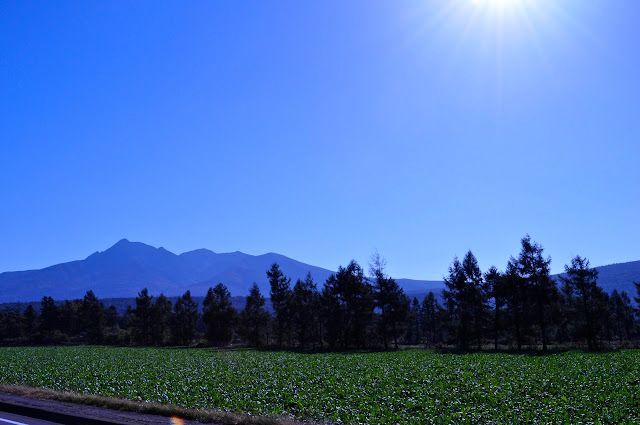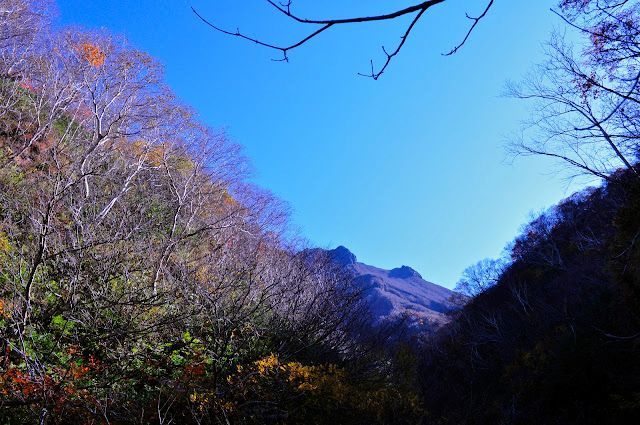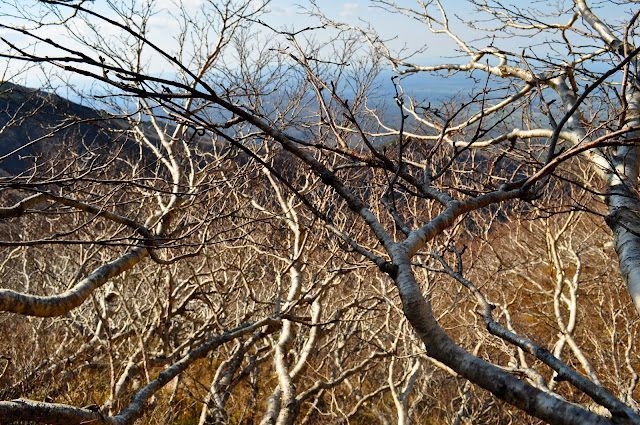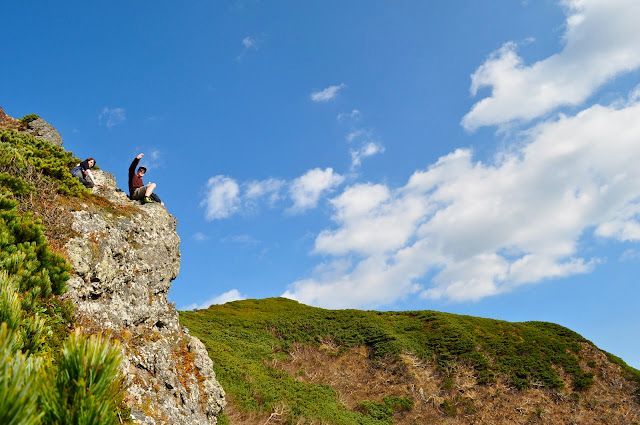Week 11
I pulled myself through layers of sleep and into the dusty room I had collapsed the night before. My sleeping bag, Japan-made, was far too small for me and I had thrown my jean jacket over my shoulders in the middle of the night, shivering with the slow cold that had fallen over the (dare I call it a) hamlet of Kiyosato. I lay for some time looking up at the tiles of the ceiling, my world still blurry around the edges, dim and out of focus with the early hour, motes of dust hanging in the sunbeams that came in great white wedges through the cracks in the curtains. The room hung this way, totally still, for ten minutes before the alarm went off and bodies began to move, shaking off the fatigue. Our host, Glen, said, "Looks like a great day for a hike!" Half asleep we peeled back the curtains, the warmth and the light moving into the room, almost tangible. The sky, cloudless and unrealistically blue, smiled down on the street and the opposite empty lot; it smiled down on the houses of the town and it smiled down on the Seicomart where we proceeded to eat breakfast; and beyond the powerlines and the awkwardly sloped steel roofing, beyond the fields mid-till, crouched Sharidake, multi-peaked and spanning some hundred and twenty degrees of horizon, reaching back up. That's where we were going.

We sped off to span the fields between the town and the mountain and cut from tar-sealed asphalt onto a gravel path through the forest, gently inclined at first but gradually growing steeper. It cut off to the old parking lot, where once upon a time there had been an old wooden lodge at the trailhead, but the lodge-keeper had been stung by one of the Japan-variety kill-you-dead hornets, and he, with the lodge, was gone forever. We made our way to the New Parking Lot, where there stood a New Lodge, built of concrete, Soviet-style, an industrial, colorless sore on the mountainside.
The early hike was fairly leisurely — mostly flat, but featuring a number of river crossings demanding a goat-like agility across stones, which each of us was more than happy to yield. We moved briskly in and out of the sun, yanking our cameras out to snap pictures of the mountainside in all of its autumnal glory, painted in yellows, reds, and greens and streaked with the bone-white fingers of the birches. Galvanized by the weather and the landscape, we followed the river up through the hollow it carved between the opposing ridgelines, the trail at times hugging the riverbank and at other wandering off into the forest. We always kept within earshot of the slowly mounting water's roar — starting off like a snake but growing into a heaving ambient thrum.

By and by we came to a point where the landscape cut upwards dramatically, the river coming down more as a waterfall than anything else, tumbling over tiers, frothing white, brutally cold. We met, here, one of the mountain's other hikers, coming down, and looking us up and down, appraising our sneakers and shorts, declared us unfit to climb. Being foreigners, and the common joke being that our constitutions are heartier than our Eastern brethren, we took little heed of his words, but admitting to ourselves that an iced-over waterfall is usually unsuitable for climbing no matter what the gear, we began to search for an alternate path.
We could not have been the first to think thusly: off to the side of the waterfall we spied what appeared to be a detour cutting sharply up into the brush — steeply, yes, but not icily. We followed this up for sometime crawling on our hands and knees, making our way out of the shadow of the opposite ridge and into the sunlight. The path began to dwindle, but drunk on the Spirit of the Pioneer and dreading returning to the gusty shadow of the river's valley below, we climbed on, and when it seemed that the path had disappeared entirely, we found a knotted rope secured to a tree above, and, using it to pull ourselves up and onto a small bluff, decided that we must be on the right track.
[Here I had originally written a thousand-word treatment of our brief sojourn in the woods, detailing our gradual losing of the path, self-doubts, bravado, &c. The Spirit of the Pioneer became a recurring motif, urging us onward, along with the general human tendency to just Go Along With It. I could relate the agonies we put our bodies through, and I could relate the punishment that we doled out, Spanish Inquisition style, upon our bodies, for crimes that they neither committed nor we questioned. My joints ached, my muscles failed, and so on and so forth. It wouldn't serve to relate to you every step we took any more than it would serve to write over and over "We pushed onwards through trees," two hundred times, and I would come out to the same number of words anyways, so let me keep it brief.]
For five hours we wandered through the woods, directionless. It was fun, and then it became not fun.

Along the way we climbed along a sheer drop-off up to the top of a bluff, and took a moment to recognize that we were the first people to climb this bluff in a very very long time (if ever), there being no path up there; and so we christened the rocky mount Glen's Knob, and we saw that it was good, and that was the end of the third hour. Two hours later, considerably more tired, and bleeding a little bit, we crashed out of the birchy forest and back onto the trail. And that was that.

Ed. note, 14/9/2021: Claiming we were the first to summit Glen's Knob in a long time was probably hubris on my part: it's very likely that a handful of enterprising backcountry skiers made their way up there each winter.
The trek back down pushed me to my limits. My body was already weary, and while I had nourished myself briefly on grilled chicken offal and spaghetti I am convinced was made with noodles and ketchup, my muscles and joints were approaching, I am ashamed to admit, the point at which they would throw up their hands and let me know in no uncertain terms that I was on my own. I fell into a sort of trance as I descended, shutting down attention to anything but the location of my footsteps and the gratitude to the hasty surrender of elevation. I briefly took note of the branches hanging out over the path — they had seemingly been polished by the hundreds of hands that had grasped them in the same spot along the descent. And so mine fell to the same places.
The sun emerged from beyond a layer of clouds that had rolled in earlier just as we completed the last of the river crossings. We had maybe half an hour's worth of light left when we spotted the Soviet lodge through the trees. As we climbed into the car, the colors shifted through bronze and into the starry blue-black of night; everywhere the sun still shone burst with color and life, while Shari cast an enormous shadow on the landscape below, already dotted with the lights of the farms, the opposite horizon aflame with reds and purples and the electric glow of Venus near the horizon.
We dined, we bathed, we washed off the sap of so much brush pine that had tugged at our clothing and skin as we passed, and eventually I made the drive back home. I crawled into bed, pulled the blankets up around my jaw, and closed my eyes. And up until the moment that my conscious self evaporated for the night, my mind was filled, PTSD-style, with the cracking of our progress through the trees.